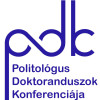Mid-term strategic plan of the Institute for Political Science (summary)
Leading the way in domestic political science: the Institute for Political Science has achieved outstanding publication performance in international journals between 2019 and 2022
Latest news
.png&w=100&h=100&zc=1)
Populism has been widely studied by academia. Yet, studies haven’t ascertained how citizens react to populism, nor how populism affects them. Check out interview with European Citizen Action Service (ECAS) executive director Assya Kavrakova and find out how DEMOS's action research fills that gap and how it will try to detect populist fakenews.
.png&w=100&h=100&zc=1)
UKIP employed a fusion-strategy, which merged their traditional critique of Europe with a critique of immigration, as a way of overcoming the low electoral salience of the EU
.png&w=100&h=100&zc=1)
Populism is not always bad, but a populist political message can divide societies between “us” and “them”, explains Jennifer McCoy, a distinguished professor of political science at Georgia State University and a senior core fellow of the Institute for Advanced Study at Central European University. In a new episode of DEMOS interviews on YouTube, McCoy discusses the main features and negative consequences of populism for democracy, like a deep political polarization, and how society can detect and react to them.

The Institute for Political Science of the Hungarian Academy of Sciences intends to honour the best English or Hungarian presentation at Conference for Doctoral Students of Political Science organized by Institute for Political Science CUB.
.png&w=100&h=100&zc=1)
Political scientist David M. Wineroither, DEMOS researcher at the Centre for Social Sciences of the Hungarian Academy of Sciences, wrote an op-ed for the Austrian national daily Der Standard. In his piece, Wineroither summarizes the structural inability for collective leadership on behalf of British Tory Brexiteers—a feature to characterize both the political ascendancy of Boris Johnson and populists in the majority of countries on the continent
.png&w=100&h=100&zc=1)
DEMOS interviews Levente Littvay, Professor of Political Science, Central European University (CEU) and member of the Team Populism on collaboration between academics and the Guardian, which has published a series of evidence-based articles on populism. Littvay also spoke about his research on populism, populist discourse, and the CEU Comparative Populism Project
.png&w=100&h=100&zc=1)
Are all political discourses evoking the role of the people in democracies necessarily populists? Check out DEMOS Budapest-based researcher Gabriella Szabó's blog post on the topic and on populist communication techniques for more.
.png&w=100&h=100&zc=1)
Jose Maria Castellà, professor at the University of Barcelona and leader of the Spanish team in DEMOS, said that the use and abuse of referenda on any subject in contemporary democracies are typical of populist parties. “These parties tend to claim that institutions of representative democracy are not representing the so called true people, and present their political action as a direct enactment of people’s will,” Castella, also a member of the Venice Commission of the Council of Europe, told “Expansión”, Spain’s leading business newspaper. The interview, on the rise and impacts of populist politics in Europe, came out on the eve of Spain’s elections.
.png&w=100&h=100&zc=1)
DEMOS project leader Zsolt Boda interviews Andrew Arato on the impacts of populism on democratic life and its relationship with authoritarianism and well-fare state.

Miklós Sebők, senior research fellow of the Institute for Political Science, CSS HAS will serve as the new director of the Institute for Political Science. His mandate is for three years, starting July 1st, 2019.
Latest posts

In the fifth pti memo blog post, we report on a lecture by Boglárka Koller, in which she presented her project titled "Cultivating Our European Resilience and Evolution" (CORE) and its significance. Boglárka Koller is the Head of the Department of European Studies at the University of Public Service, Senior Research Fellow at the Centre for Economic and Regional Studies (KRTK), and Jean Monnet Chair. The lecture was hosted by the HUN-REN CSS Institute for Political Science on May 22, 2025, as part of its Speaker Series.

The latest post of the pti memo blog series offers insights from a thought-provoking lecture by Murat Somer, Professor of Political Science and International Relations at Özyeğin University Istanbul and Research Affiliate at the Democracy Institute of the Central European University. Titled "Quo Vadis in Turkey and Implications for Democracy in the World", the lecture explored current political developments in Turkey and their broader implications on combating democratic backsliding. The event took place on May 8, 2025, as part of the HUN-REN CSS Institute for Political Science’s Speaker Series.

The third blog post of the pti memo series summarises the lecture of Dr. Matthew Edward Bergman, Assistant Professor at Corvinus University of Budapest, titled “Ideological Conflict, Logrolling, and Policy Reform: An Analysis of Government Declarations in Western Europe.” The event was organised as part of the HUN-REN Institute for Political Science’s Speaker Series on April 10, 2025. This research, conducted jointly with Hanna Bäck (Lund University) and Wolfgang C. Müller (Universität Wien), investigates why some governments commit to more reform measures in their government declarations.

The second pti memo post summarises the lecture by Bálint Magyar and Bálint Madlovics, researchers at the CEU Democracy Institute, titled “The Russia-Ukraine War and Its Structural Consequences.” The event was organised as part of the HUN-REN Institute for Political Science’s Speaker Series on February 6, 2025.
Hungary is often portrayed as a problem case for European integration due to frequent clashes between Viktor Orbán’s government and the EU’s institutions. Yet, as András Bíró-Nagy and Gergő Medve-Bálint explain in their post on the LSE EUROPP blog, the country’s 20 years in the EU have also seen a relatively high level of compliance with EU policies and strong support for membership among the public.
.png&w=100&h=100&zc=1)
In the first pti memo post, we summarise Christian Baden’s (Hebrew University of Jerusalem) thought-provoking lecture titled “Propaganda as a Social Process.” The lecture was hosted by the HUN-REN Institute for Political Science as part of its Speaker Series event series on January 23, 2025.
.png&w=100&h=100&zc=1)














.png&w=100&h=100&zc=1)